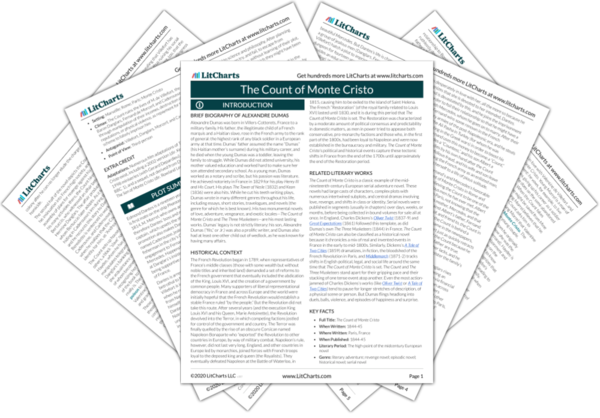Poison and the act of poisoning also feature in the novel, and when they do, they have a dual symbolic function. Poison in The Count of Monte Cristo can refer to a chemical used to harm another person, and it can refer to an emotional poisoning—when an idea, such as revenge, warps a character’s personality and behaviors. In both cases, poisoning is a complex phenomenon, for as Dumas presents it, any “poison,” whether a chemical or an idea, can be helpful in certain smaller doses—insofar as it inoculates against future harm—and dangerous in larger doses. Poisons can steel characters for difficult circumstances—until those poisons overwhelm them and become the difficult circumstance that figure must withstand or overcome.
In prison, the Abbe Faria demonstrates to Dantes that a small red tincture, which he uses as medicine, can ward off instances of stroke, to which he is prone. This chemical, as Dantes later finds out during his travels in the East, is called “brucine,” and it is a poison. In large doses, brucine can actually cause stroke. Thus brucine is a perfect example of a dangerous chemical that, in small-to-moderate amounts, allows a person to build up physical strength. But in large doses, brucine can shut down the body and cause death. Noirtier encourages Valentine to take small amounts of brucine when he finds out that Mme de Villefort is using that poison in large quantities to harm others in the house.
On the emotional side, the Count’s life after prison is poisoned by the idea of revenge. In small “doses,” this desire for revenge can seem righteous, and indeed the Count executes his vengeance against Villefort, Caderousse, Danglars, and Fernand with great vigor, believing as he does so that his sense of moral outrage is purifying and self-justifying. But this cleansing process, when taken to extremes, misaligns his ethical compass. For, as Mercedes warns him at the close of the novel, he has very nearly harmed people like Albert, or herself, in his attempts to damage the lives and reputations of people like Fernand. And in allowing Mme de Villefort to continue her campaign of poisoning in order to ruin the Villefort house, the Count discovers that she has also murdered her own son, Edouard, who was innocent of any wrongdoing. It is only through the countervailing power of love, for Maximilien, Valentine, and Haydee, that the Count is able to dismiss the more poisonous aspects of revenge, no matter how ethical and deserved. In rejecting vengeance and embracing love, the Count begins a new life in the novel’s final chapter, free of the poisonous intoxications of violence.
Poison Quotes in The Count of Monte Cristo
A drop of that elixir sufficed to bring the child back to life when he was dying, but three drops would have driven the blood into his lungs in such a way as to give him palpitations of the heart. Six would have interrupted his breathing and caused him a much more serious fit than the one he was already suffering. Ten would have killed him.

Unlock explanations and citation info for this and every other The Count of Monte Cristo quote.
Plus so much more...
Get LitCharts A+









